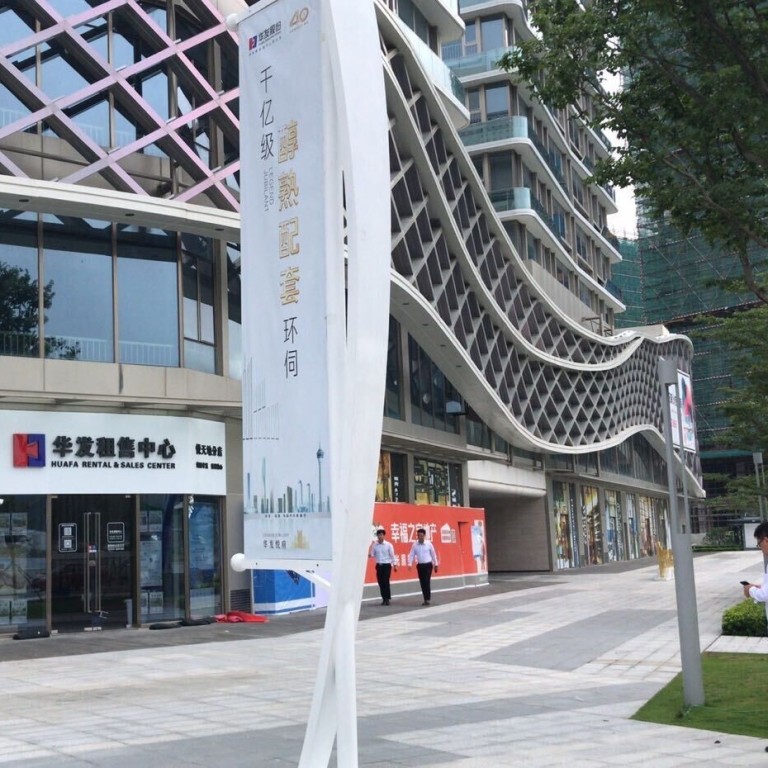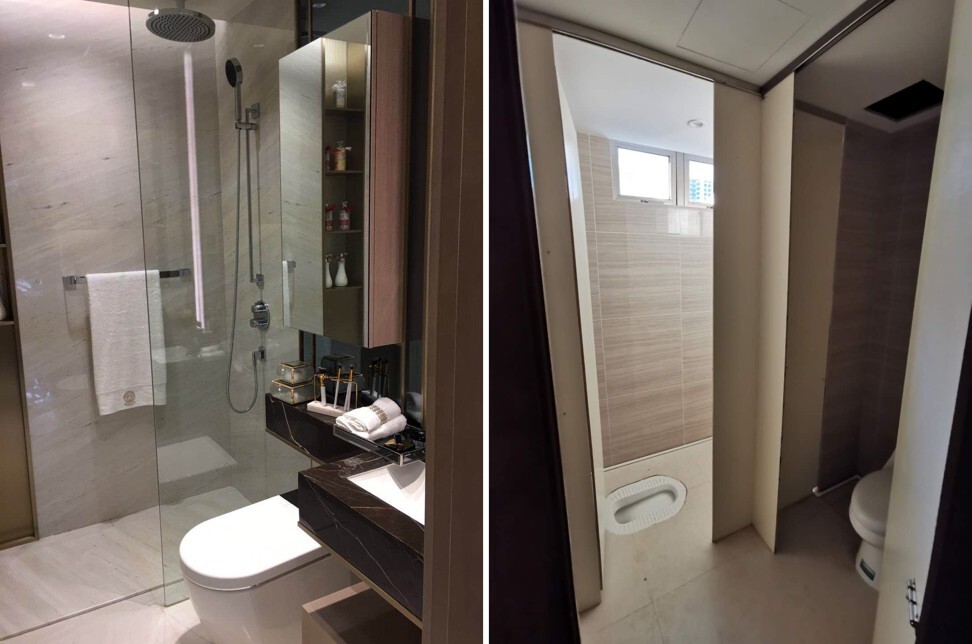
For 14 Hong Kong investors, their Hengqin dream homes, with a single toilet between 14 flats, do not live up to the advertising
- The Huafa Yuetiandi, a six-storey tower and part of a multiphase project by Huafa Industrial Zhuhai, was marketed as a commercial-residential mixed use project
- At least 14 Hong Kong buyers were enraged when they received their purchase agreement showing their property to be strictly for commercial use, with one shared toilet between 14 units
A real estate project in Zhuhai city’s Hengqin district that was sold as commercial-residential property for mixed use has evolved into a potential legal wrangle, as at least 14 Hong Kong buyers are planning legal action on claims of being misled by the developer.
The Huafa Yuetiandi, a six-storey tower and part of a multiphase project by Huafa Industrial Zhuhai, was built on commercial land, and forbidden to be used as abodes. Buyers who were sold the project as mixed-use real estate were enraged when they found that there was only one shared, public toilet for 14 units on each floor. They are demanding for the developer to refund their “furnishing fees”.
“I felt like I was cheated,” said Salina Lau, a civil servant in her 30s who paid 2.57 million yuan (US$369,800) for a flat measuring 63.72 square metres (686 square feet) as retirement home for her father. “The agent [initially] said it was for commercial-residential use. We saw there was a washroom and kitchen in the showrooms, but they turned out to be usable only in an office environment where multiple units shared a common toilet, she said.
Huafa Industrial, based in Zhuhai city, did not respond to emailed requests and phone calls for comment. The episode underscores the potential risk for buyers in cross-border investments, especially where it comes to the fine print of contracts, trusting the assurances of developers and sales agents and the difference between illustrations and reality. Buying property outside Hong Kong is “very complicated”, and “consumers should stay vigilant,” said the city’s Estate Agents Authority, in a statement.

Hongkongers are allowed to buy up to two residential units each in Zhuhai, following the liberalisation of local ownership rules last November. Before then, their only access to abodes in the city neighbouring Macau is through buying space that could be used as homes, built on commercial land.
Up to 80 per cent of all projects on sale in Hengqin are of this nature, according to an estimate by Sam Yan, a director at Century 21, a real estate agency, in Zhuhai. Only about four to five projects, making up 7 per cent of Hengqin’s land, were allocated for residential use, he said.
“The government originally [designed] Hengqin as a central business district, like Pudong and Binhai,” said Yan. “But [now] it feels like Hengqin has become full of housing.”

Huafa’s project comprises multiple phases in Hengqin, an island across the Lotus Bridge from Macau that was designated as a new economic area similar to Shanghai’s Pudong and Tianjin’s Binhai areas. The first two phases of the project are sold for residential use, while the third phase was marketed as mixed use.
Block B1 of Phase 3, a six-storey building inclusive of a three-storey shopping centre, where Lau has bought her father’s retirement home, is the one that has generated the most controversy, because of about 250,000 yuan in “furnishing fees” collected on each property. Asked why the purchase agreements stipulated commercial use only, the project’s Hong Kong sales agent said buyers can just add a bed to turn the space into homes, Lau said.
Blocks A1 and A2, both with 11 floors, were fitted with two toilets on every floor. But since buyers did not pay any furnishing fee, they were able to receive a refund on their purchases with no complaints.
Huafa Industrial had agreed to refund the purchase price of each property, excluding the furnishing fee, and another 150,000 yuan in a so-called group buying fee, or commission.
Lau was not alone in contemplating legal action. Linda Truong, a pensioner in her 50s, paid 2.51 million yuan for a 64.2-metre unit for retirement. The developer was notified in June 2018 by the Hengqin authorities that the project’s commercial use could not be changed into residential purposes, but Huafa still sold the property as “flats” a month later, Truong said.
“When we asked, they said the rule had not been [relaxed] and all Hong Kong and Macau people had to buy these [homes built on commercial land],” said Truong.
Hongkongers need to beware whether the flats has access to gas fuel and the water and electricity cost in each district, said Li Yujia, senior economist and assistant to officer at Guangdong Urban& Rural Planning and Design Institute.
“This is a grey area. If it is for commercial use in planning, with the developer privately changing the purpose, the living experience of the flat will be very bad,” Li said. “On the mainland, especially in the Greater Bay Area, projects tend to be particularly large, so they often become commercial-residential use if they are unable to attract investments in the short term.”

